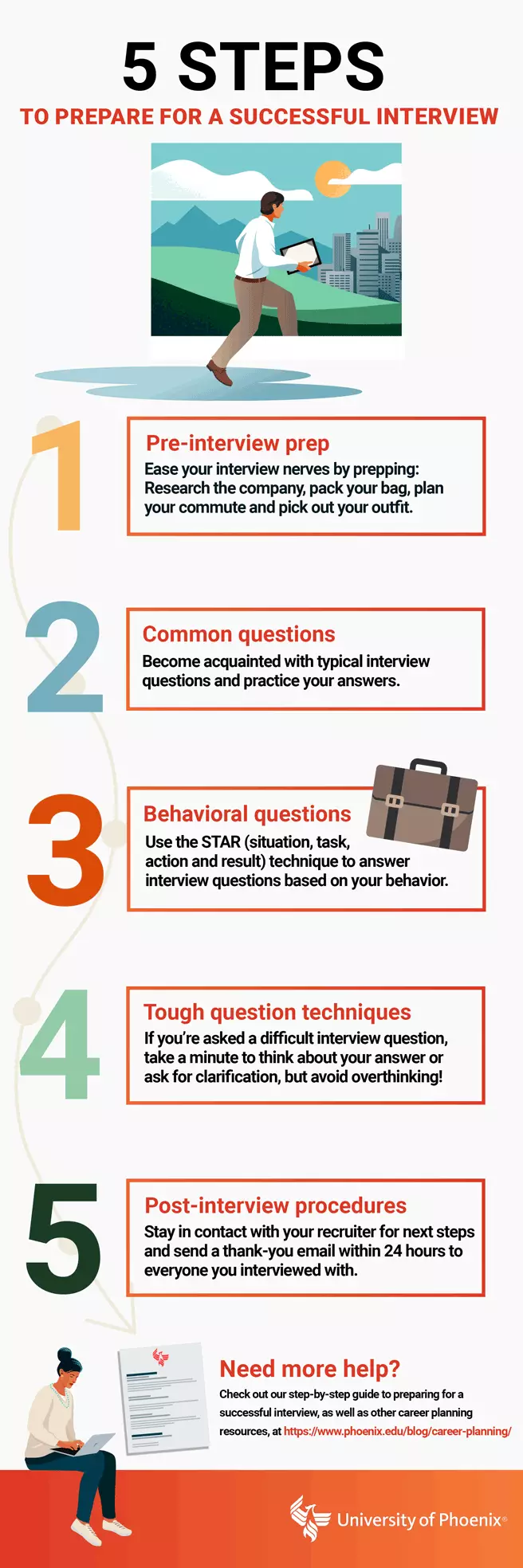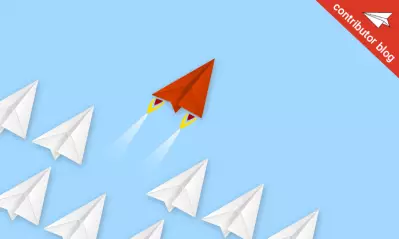A career advisor's guide to preparing for a job interview
ЕўВтЬ§Elizabeth Exline

This article has been vetted by АФУХЬьЬьВЪПЊНБМЧТМ's editorial advisory committee.Ь§
Read more about our editorial process.

Reviewed by Jessica Roper, MBA,Ь§Director of Career Services
At a glance
- Interviewing is a nerve-wracking, but essential, part of any job search. Ease your nerves by knowing how to prepare for a job interview (both in-person and virtual) ahead of time.
- Practice common job interview questions before the big day to boost your confidence. If youтre caught off guard by a question, donтt be afraid to pause or ask the interviewer for clarification.
- Keep in touch with your recruiter and send a thank-you email to your interviewers after a job interview.
- If you need more help, download ourܧInterview Guideܧon how to prepare for an interview, which includes additional tips and resources.
This article was updated on December 5, 2023.
Job interviews 101
Thereтs a reason why job interviews are the stuff of nightmares. The idea of being caught off guard when youтre trying to impress someone is enough to give even the most confident person pause. But interviewing is an essential part of any successful job search. The key to doing it well is to prepare, practice and perhaps reframe your perspective a little. An interview, after all, is more than just an opportunity to prove youтre a good candidate for a role. Itтs also a chance to see if the role is something you really want.
Standing out in an interview can be difficult, especially if you havenтt been interviewing for a job in a while. To make a great first (and second and thirdтІ) impression in your job interview or interviews, weтve compiled some of the best advice, job interview strategies and virtual interview tips. Read on to learn how to stand out!
Even the bravest person can get nervous before an interview! For more tips, read our Interview Guide, which includes additional interview guidance.
How to prepare for a job interview
First, youтll want to start with some basic interview prep.
тAlways research the company to understand the style of dress appropriate for the workplace,т says Steven Starks, senior manager of Career Advising Programs and Operations at АФУХЬьЬьВЪПЊНБМЧТМ. тYou can even ask a human resources representative [at the hiring company] if you donтt know. Every workplace is different in terms of level of formality, but itтs safe to dress one level up from the normal work attire. And it goes without saying that you should be well-groomed with an outfit that is clean, wrinkle-free and comfortable but not loose.т
Select an outfit the evening before your interview. Be sure to try it on and check yourself out from every angle to make sure it creates the impression you want it to create. Doing this in advance will save you time and frustration in the morning, which means you can devote any extra hours you have to prepare for the hard part: job interview questions.
Hereтs what to do:
- Review the original job description. If itтs no longer available to you because the posting expired or you canтt find it, email the recruiter or hiring manager to request it again. Then print it out and make notes, either on paper or mentally, of how you meet each qualification. Think about examples that illustrate your abilities.
- Research the company. Check out what other employees say about working at the company ( is a great resource for this) but also look at other perspectives. Is the company involved in any corporate responsibility projects? How big is it? When was it founded? Who comprises the leadership? Knowing these facts can make your interview more of a conversation where you and your interviewer are speaking the same language.
- Compare your resumУЉ with the job description. If, for example, you are being hired to work in PR, look for phrases in your resumУЉ that you can match to the ones in the job description, such as тdraft press releasesт or тmanage social media campaigns.т These are clues about where your conversation during the job interview will take you.
- Anticipate interview questions and your answers. Starks notes: тThe most common interview questions prompt you to talk about your background, motivations, strengths (and weaknesses) and knowledge of the company and position. No matter how the questions are phrased, these topics are nearly universal to any job interview.
тYou should also expect behavioral questions that ask you to share specific examples of how youтve demonstrated certain skills. When answering behavioral questions, use the STAR format, which stands for situation, task, action and result. Itтs a helpful way to structure your responses by providing context about the situation, explaining the task you set out to achieve, describing the specific actions you took, and sharing the results or outcome of your actions,т he says.
And, to all of this, add the inevitable curveball question. You canтt prepare for what you donтt know to expect (e.g., тWhat was the biggest mistake you ever made at work?т) but you can expect the unexpected. If you canтt think of an answer on the spot, ask to return to that question later in the interview. Thinking clearly to provide a good answer can take time, and itтs okay to ask for it.
5 expert tips for your next job interview
1. Change your lens

For anyone anxious about going into an interview, it can boost your confidence to remember that youтve already passed the first test. If a hiring manager wants to meet you, itтs because he or she agrees that your skills and experience line up with those required by the role.
Consider a job interview a way to learn more about both a position and a company. Just as you are more than your resumУЉ, the work experience at a company is more than a job listing.
In the end, a job interview is a two-way street. Youтre not there to perform or impress. Youтre there to share and to learn.
2. Preparation is key

Itтs important to prepare to make the most of a job interview. And this begins with due diligence. Research the company where youтre applying to learn about its history, mission and achievement.
Similarly, check out the LinkedIn profiles of anyone interviewing you. It helps to know how you can relate to the person, and if you have contacts or experience in common, so much the better.
Next, pull together everything youтll need for the interview. Try on your outfit ahead of time to make sure it fits well, and is clean and ready for your big day. Make sure you bring several copies of your resumУЉ, a list of professional references and a notepad and pen to take notes during your interview.
Much of this applies to as well. Itтs important to dress appropriately, make eye contact and practice professional body language. (No slouching!) But instead of making copies of your resumУЉ, you should test your technology ahead of time to ensure itтs in working order. Also, find a quiet, distraction-free space where you can take the interview.
Finally, itтs a good idea to use all the research youтve done to come up with a list of . Questions about job responsibilities, company culture and expectations help pull back the curtain on what working in that position would be like on a day-to-day basis.
3. Tips for extroverts and introverts

When it comes to presenting yourself in an honest and positive light, there are some universal tips out there. Itтs a good idea, for example, to master the of answering questions. But itтs also wise to consider your personalityтs strengths and weaknesses in the context of an interview.
Introverts and extroverts handle social situations very differently and accordingly bring their own assets and challenges to the table.
If you feel energized after social interactions, if you are whatтs commonly known as a тpeople person,т you can put that to work for you. Being enthusiastic and a good storyteller can burnish your image, for example. But take those qualities too far, and you can appear disingenuous or sales-like, which might hinder you.
Keep in mind the importance of being yourself but not selling yourself, asking questions about the company and interviewer, and responding to the social cues the person youтre talking with is giving you.
For people who identify as introverted, interviews present a unique challenge: Feeling comfortable with someone takes time for an introvert т and time is one thing you donтt usually have in an interview. Still, there are this structural disadvantage. For starters, youтll need to practice reviewing your experience and answers to common interview questions.
Doing this with a friend is best, but you can also do it alone. The goal is to become fluent in talking about yourself, your experiences and your challenges and successes. Do it frequently enough, and you donтt have to overthink it in an interview. It may even help you relax to be in familiar territory.
It can also help to write out responses to standard interview questions. This process not only solidifies your responses but also can help clarify your message and allow you to deliver it succinctly and efficiently.
4. When time is against you

While the ideal interview situation might include a few days of lead time, the real world doesnтt always allow for that. So, what do you do when youтre invited to interview тІ that afternoon?
There are a couple of ways to in a situation like this. First, ask for a detailed job description, do basic research on the company and then figure out where you need to be and how much time you need to get there. (Or, for virtual interviews, download the requisite platform and identify a quiet place to take the meeting.) Even having a top line understanding of the companyтs history, mission, size and partners will help you develop relevant responses to interview questions.
Next, think about some situations that underscore your skills and achievements and get ready to talk about them during your job interview. You wonтt be able to rehearse this extensively, but identifying a few key experiences that you can reference during your interview will help you get your point across.
The good news? If you donтt have a lot of time to prepare, your interviewer may give you a little more latitude during the conversation.
5. The end is just the beginning

After your interview, be sure to follow up with everyone you talked to. Whether itтs an email or an , express appreciation for their time and let them know how much youтd like to work with them in the future.
If youтve been informed of when a decision will be made, or if further interviews are required, mark your calendar to follow up at the right time. Being proactive with this step, after all, is just one more way to demonstrate you have the skills and the drive to take on the job.
Addressing salary expectations
The toughest part of a job interview process may just be the salary negotiation. If youтre asked about your salary expectations (which can happen before the interview itself), think about answering this without getting too specific. (If your salary is too high and you seem inflexible, it could be a dealbreaker for the company.)
For example, if the range in your industry is about $90,000, donтt ask for $150,000 and hope the company will meet it. That kind of тhighballт offer could put off a company, especially a small one. Instead, consider phrasing your salary requirements as negotiable: тGiven my qualifications and achievements, is $60,000 (negotiable).т
тEffective negotiation begins with research,т says Starks. тYou should have a thorough understanding of the salary range for the role and for the market youтre in. Use multiple sites like , , Glassdoor.com or to get an average. Also, research professional associations that may have salary data. Leverage your network to inquire about the kind of compensation package to expect, depending on certain levels of experience.т
Starks also recommends that, when negotiating, you concentrate mainly on your тmust-haveт requirements and separate them from things youтd like your employer to offer you as part of the role (aka the тnice-to-havesт).
Says Starks: тThereтs more to a job than just compensation, so be prepared to negotiate for what matters most to you instead of just negotiating for the sake of тgetting more.тт
He adds that: тNegotiating is about creating a win-win scenario, not a loser-and-a-winner outcome. When engaging in negotiation, do not leverage emotional arguments or personal reasons, but rather make a business case for what you want. For example, asking to work remotely because you want to save money on car repairs isnтt going to serve you. Instead, build a case for how it may lead to increased productivity.т
Need additional career support? Visit the АФУХЬьЬьВЪПЊНБМЧТМ YouTube channel to hear 5 steps to preparing for a successful interview from UOPX career advisor Jason Robert.
Sign up for our LinkedInТЎ newsletter to receive career planning tips, resumУЉ help and more.Ь§
Virtual interview tips and surprises
In todayтs work-from-home world, virtual interviews are increasingly the norm. Be prepared with the following:
- Have a quiet space with a neutral background where you can conduct the interview.
- Make sure your internet connection is good, your camera is on and you have the right platform installed on your device.
- Check for any time differences and plan accordingly. Your interviewer may have booked you for a 2 p.m. call, but if that person is in a different time zone, you may need to be ready earlier or later than that.
- Look at the camera during your interview, not your screen.
- Minimize disruptions, even if that means turning on a movie for the kids in a different room while you take your interview.
Finally, if your interviewer surprises you with a highly specific question and you donтt know the answer, donтt panic.
As Starks says: тMake your best attempt. Without an answer, the interviewer is unable to evaluate you as a candidate. Therefore, having no response, or simply saying тI donтt know,т is the worst response you can give. To the best of your ability, think about the question out loud and let the interviewer understand your thought process as you arrive at the best possible answer.т
Starks suggests having an example ready of a time you were stumped by something in your working life and how you resolved it. Maybe, he says, тyou reached out to your network to crowdsource the collective wisdom of your contacts or rapidly upskilled by reading books or taking online courses.т
Overall, standing out in an interview requires time to prepare and practice, with the patience to know that interviewing itself is a skill and one that improves with every experience. So even if you donтt get the first job you interview for, know that the interview alone has served you. And thereтs always the next one!

Ь§
Ь§

ABOUT THE AUTHOR
Elizabeth Exline has been telling stories ever since she won a writing contest in third grade. She's covered design and architecture, travel, lifestyle content and a host of other topics for national, regional, local and brand publications. Additionally, she's worked in content development for Marriott International and manuscript development for a variety of authors.
read similar articles


